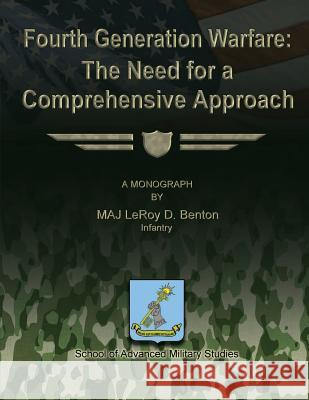Fourth Generation Warfare: The Need for a Comprehensive Approach » książka
Fourth Generation Warfare: The Need for a Comprehensive Approach
ISBN-13: 9781480022546 / Angielski / Miękka / 2012 / 52 str.
This study explores whether the current United States military strategy should focus more on a comprehensive interagency approach as a more efficient way of focusing all elements of national power to defeat our enemies in the Long War on Terrorism. The method used to determine this question is initially accomplished by framing the scope of the current operating environment in the context of Fourth Generation Warfare. The definition of Fourth Generation Warfare is developed based on Col. Thomas X. Hammes' writings and then is further developed to show relevance and applicability to current operations in the Long War on Terrorism. A comparative analysis is conducted by utilizing a single case study of the United States experience during Vietnam. This is done to develop an understanding of the Civil Operations and Revolutionary Development Support (CORDS) program in order to gain an understanding of the lessons learned while conducting interagency operations during the Vietnam conflict. The analysis identifies how the collaboration and coordination of all governmental agencies was used to conduct operations during Vietnam. These lessons are then compared to the current written policy and guidance and then assessed to determine if an appropriate level of synchronization and coordination are currently being utilized to meet our National objectives in the Long War on Terrorism within the context of the current operating environment. The findings of this study are that the current United States military strategy is making considerable progress within this context. This study also concludes that the national strategy, however, should focus even more on a comprehensive interagency approach as a more efficient way of focusing all elements of national power to defeat our enemies in the Long War on Terrorism.
Zawartość książki może nie spełniać oczekiwań – reklamacje nie obejmują treści, która mogła nie być redakcyjnie ani merytorycznie opracowana.











